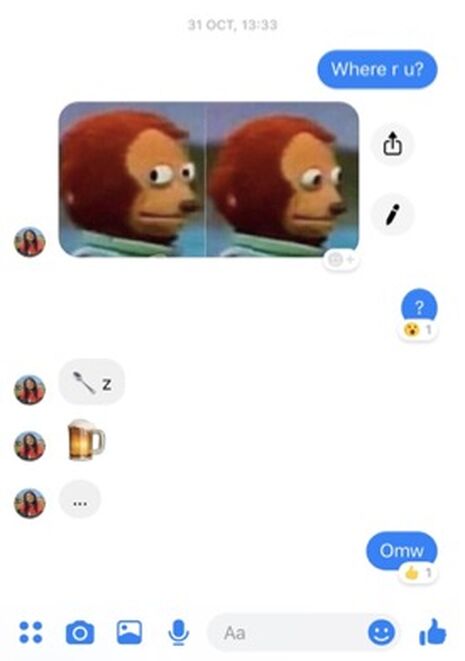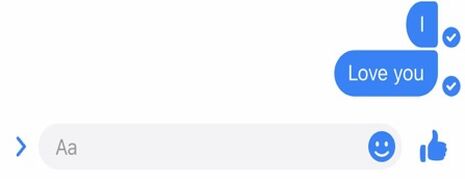How online vernacular is changing the way we communicate
Examining the poetics of online messaging, Isaac McDonald and Mojola Akinyemi argue that we are developing a new and differentiated form of communication

Take a moment to think about what someone living 30 years ago would make of the below conversation. It would have barely been intelligible, and this should show us how foreign the language we use to message online is from that of the letter-writing and phone calling generations that lived in the 20th century.

The ‘online vernacular’ seen here is a language of images, acronyms, formalised emotional responses. Conversations are no longer limited by time or space. This is a language where a single question mark or ellipses can communicate a literal non-message, waiting, a sense of insult, a sulky expectation. It is an interface holding a prismic mirror up to face-to-face interactions, forming a method of communication that should be treated as related, but independent to this in its limitations and possibilities.
If, as Cambridge students are wont to do, we quote Wittgenstein’s now quasi-cliched proverb ‘The limits of my language are the limits of my mind’ the growth of this language over the course of the past two decades has great import for understanding the changing ways the social media generations are conceptualising relationships, friendships, jokes, intimacy, trust, anger.
This subject deserves more careful study than can be done in an 800 word article, but I want to share a few thoughts I’ve had about this, by way of starting a conversation, nudging some thoughts along, creating greater self-awareness about this language most Cambridge students use daily and perhaps don’t even notice.
The online vernacular offers new possibilities for communicating with people. But this should also be treated with caution
One of the most significant changes in the way we communicate online as opposed to in person is that conversations in person are compressed into a stream of connected moments and spaces. Conversations using the online vernacular are not. It is possible to have a conversation over the course of several months if you are as bad at replying as I am.
This raises another important point, the precise control that users have over their presentation in the conversation. This issue of online presence has been discussed at great length regarding Instagram and Facebook public identities, but overlooked in this regard.
Reacts and emojis formalise emotional responses. They are the distorted reflection of body language signals that convey so much nonverbal information in face-to-face interactions. It is now possible to say exactly what you want, fabricating emotional responses, spending heinously long periods of time (you ought to be reading) agonising over how to respond to that boy or girl from Fez (we’ve all been there).
Try and describe the emotional information this meme (yes we are talking about memes) conveys in words:

I would argue it’s almost impossible to do this because in this particular meme, and in many others, the nonverbal has been integrated into what was once a purely verbal platform, a defining feature of the online vernacular compared to letter writing and emails.
Memes, like reacts and emojis, formalise a face-to-face event; the joke. They are the displacement of the joke event from a specific time and a specific space and even from specific people. Memes could be seen as conventions of this language, forming a template into which an unthinkable motley of the most universal and the most inside jokes can be placed.
Another defining feature of the online vernacular is its appropriation of poetic techniques, as opposed to letters and emails which are standardly prosaic. Like in poetry, form allows the ability to present the same words in many different forms to effect differences in tone. Look at this example:

To me seems a lot more serious, heartfelt, sombre but said with full feeling than this:

Which is bouncy, still sincere, but more lighthearted. The rhythm is buoyant, the phrase is divided into monosyllables which skip downwards.

Here a change has again altered the rhythm. A short pause inserted after ‘I’ subtly changes the tone, there’s a moment of consideration embedded in the form of the message. The hesitation is followed by the simple resolution, what I see as being a kind of happy release into loaded words that are considered and chosen consciously.
The ability to embed rhythm into communication, using multiple lines for a sentence; the ability to send nonverbal information through the use of images; the ability to construct a communicative surface unconstrained by the pressures of time and space, are all tools poets have been using for centuries.
This is exciting. The online vernacular offers new possibilities for communicating with people. But this should also be treated with due consideration.
This language our generation has built, and is building, is a new phenomenon that is changing the ways we think, whether we realise it or not
If you’ve ever been left on read, ghosted or bullied online then you will know how psychologically damaging it is to have such an abusive relationship located in your pocket as you go about your day. Messaging someone online comes with the expectation of them replying, and in turn the obligation to reply is conferred. The power dynamic in a conversation where it is possible to not reply, it is possible to block it off completely, it is possible to say things that would not be said in a face-to-face conversation, is drastically different than ‘real’ life.
It is unfortunate that the growth of the online vernacular as a language to be celebrated and enjoyed and explored has been so smudged by people mistreating it and other people, but this remains an unmistakable characteristic of the new way of communicating with other people.
This language our generation has built, and is building, is a new phenomenon that is changing the ways we think, whether we realise it or not. This deserves careful attention and we should definitely realise it as a powerful force shaping our psyches, and treat it with appreciation, but also, importantly, with caution.
 News / Colleges charge different rents for the same Castle Street accommodation2 March 2026
News / Colleges charge different rents for the same Castle Street accommodation2 March 2026 News / King’s hosts open iftar for Ramadan3 March 2026
News / King’s hosts open iftar for Ramadan3 March 2026 Theatre / Lunatics and leisure centres 4 March 2026
Theatre / Lunatics and leisure centres 4 March 2026 News / Angela Merkel among Cambridge honorary degree nominees27 February 2026
News / Angela Merkel among Cambridge honorary degree nominees27 February 2026 News / News in Brief: waterworks, wine woes, and workplace wins 1 March 2026
News / News in Brief: waterworks, wine woes, and workplace wins 1 March 2026









